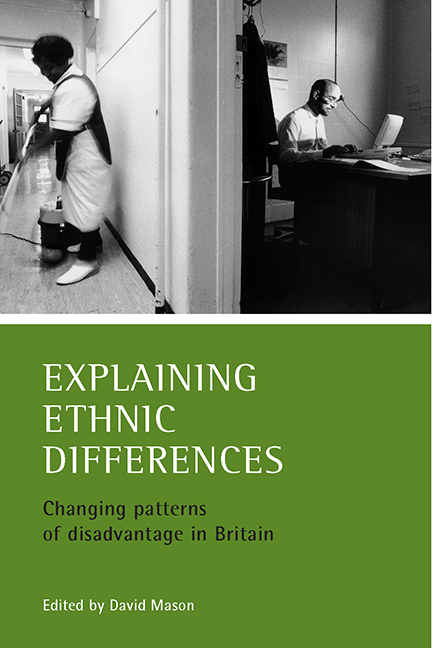Book contents
- Frontmatter
- Contents
- List of figures and tables
- Foreword
- Notes on contributors
- one Introduction
- two Changing ethnic disadvantage: an overview
- three The demographic characteristics of people from minority ethnic groups in Britain
- four Ethnic differentials in educational performance
- five Changing patterns of ethnic disadvantage in employment
- six Patterns of and explanations for ethnic inequalities in health
- seven Housing black and minority ethnic communities: diversity and constraint
- eight ‘All the women are white, all the blacks are men – but some of us are brave’: mapping the consequences of invisibility for black and minority ethnic women in Britain
- nine Police lore and community disorder: diversity in the criminal justice system
- References
- Index
three - The demographic characteristics of people from minority ethnic groups in Britain
Published online by Cambridge University Press: 20 January 2022
- Frontmatter
- Contents
- List of figures and tables
- Foreword
- Notes on contributors
- one Introduction
- two Changing ethnic disadvantage: an overview
- three The demographic characteristics of people from minority ethnic groups in Britain
- four Ethnic differentials in educational performance
- five Changing patterns of ethnic disadvantage in employment
- six Patterns of and explanations for ethnic inequalities in health
- seven Housing black and minority ethnic communities: diversity and constraint
- eight ‘All the women are white, all the blacks are men – but some of us are brave’: mapping the consequences of invisibility for black and minority ethnic women in Britain
- nine Police lore and community disorder: diversity in the criminal justice system
- References
- Index
Summary
Introduction
In recent decades, the existence of a growing population of people from ‘minority ethnic groups’ within the UK has attracted increasing attention from politicians, policy makers, the media and academia. The minority ethnic groups of policy interest comprise people who are visibly identifiable because their skin colour is brown or black (unlike most European national minorities), and whose family origins lie in the countries of the New Commonwealth: the Indian subcontinent, South East Asia, the Caribbean and Sub-Saharan Africa.
Although small numbers of people with such origins have lived in the UK for centuries, their populations increased dramatically during the second half of the 20th century as a result of high rates of immigration in the 1950s and 1960s, reinforced by high birth rates. Minority ethnic groups now form a significant component of the British population, especially in the younger age groups, and a substantial proportion of the population of London, Birmingham and other major cities. As the pace of globalisation increases and barriers to international travel decline, the diversity of the British population is also increasing as a consequence of new flows of primary migration.
This chapter describes the growth of the minority population, the current ethnic profile of the British population (using data for 1998-2000), the geographical distribution of minority ethnic groups, and the demographic trends underlying the continued growth in the minority population over the medium term.
Evolution of the minority ethnic group population
Statistics on the ethnic composition of the British population began to be compiled only from the late 1970s onwards. Therefore, the growth of the minority population from 1945 to 1981 can only be gauged from Census data on the number of people born outside the UK as well as periodic estimates made by the Office for Population Censuses and Surveys (OPCS, 1976, 1977).
The initial growth of the minority ethnic group population of Britain began in the era of mass immigration from the New Commonwealth, which lasted from the passing of the British Nationality Act in 1948 to the mid-1970s. The minority ethnic group population of England and Wales increased from 103,000 in 1951 to 415,000 in 1961 (Eversley and Sukdeo, 1969), and to 1.2 million in 1971 (Runnymede Trust and Radical Statistics Race Group, 1980).
- Type
- Chapter
- Information
- Explaining Ethnic DifferencesChanging Patterns of Disadvantage in Britain, pp. 21 - 52Publisher: Bristol University PressPrint publication year: 2003



